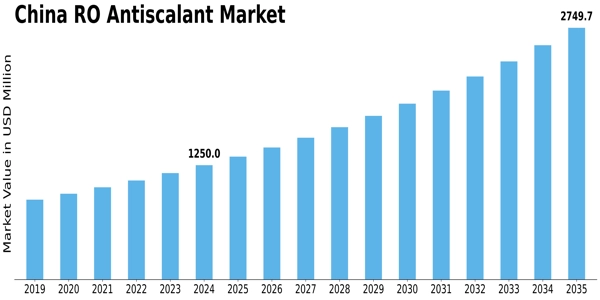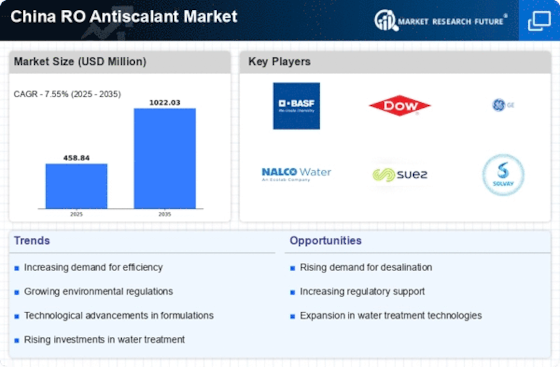Increasing Water Scarcity
The Global China RO Antiscalant Market Industry is experiencing heightened demand due to increasing water scarcity across various regions. As freshwater resources become more limited, industries are turning to reverse osmosis (RO) systems for water purification. This trend is particularly evident in urban areas where population growth exacerbates water shortages. The need for effective antiscalants to prevent membrane fouling is critical in ensuring the longevity and efficiency of RO systems. In 2024, the market is projected to reach 1250 USD Million, reflecting the urgent need for innovative solutions to address water scarcity challenges.
Market Growth Projections
Growing Awareness of Water Quality
There is a growing awareness of water quality among consumers and industries, which is positively influencing the Global China RO Antiscalant Market Industry. As public health concerns regarding waterborne contaminants rise, the demand for high-quality water treatment solutions increases. Industries are investing in advanced RO systems to ensure the safety and quality of their water supply. This trend is expected to contribute to the market's expansion, with projections indicating a significant increase in market value over the coming years. The emphasis on water quality is likely to drive innovation in antiscalant products.
Industrial Growth and Urbanization
Rapid industrial growth and urbanization in China are driving the Global China RO Antiscalant Market Industry. As industries expand, the demand for clean water for manufacturing processes increases, necessitating the use of RO systems. Urbanization leads to higher water consumption, further intensifying the need for effective water treatment solutions. The market is expected to grow significantly, with projections indicating a rise to 2750 USD Million by 2035. This growth is indicative of the increasing reliance on advanced water treatment technologies to support industrial activities and urban infrastructure.
Technological Advancements in Water Treatment
Technological advancements in water treatment processes are significantly impacting the Global China RO Antiscalant Market Industry. Innovations in antiscalant formulations and RO membrane technologies enhance the efficiency and effectiveness of water purification systems. These advancements lead to reduced operational costs and improved water recovery rates, making RO systems more attractive to various industries. As the market evolves, the introduction of novel antiscalants that address specific scaling challenges is likely to drive further growth. The industry's adaptability to technological changes is crucial for maintaining competitiveness in the global market.
Regulatory Compliance and Environmental Standards
The Global China RO Antiscalant Market Industry is influenced by stringent regulatory compliance and environmental standards. Governments are implementing policies that mandate the treatment of wastewater and the reduction of pollutants in water bodies. As a result, industries are compelled to adopt RO systems equipped with effective antiscalants to meet these regulations. This trend not only ensures compliance but also promotes sustainable practices within various sectors. The anticipated compound annual growth rate of 7.43% from 2025 to 2035 underscores the market's responsiveness to evolving regulatory landscapes.










Leave a Comment